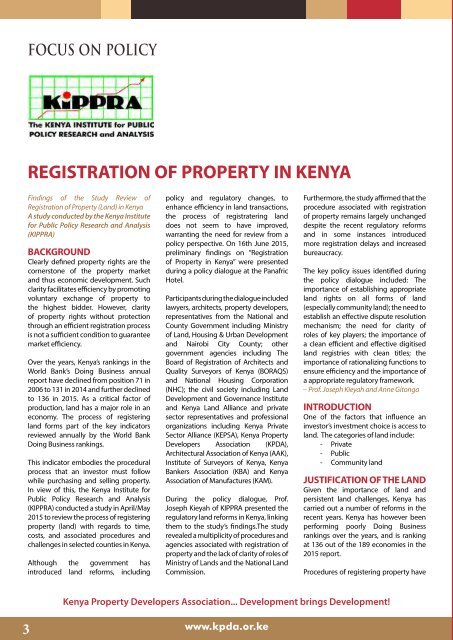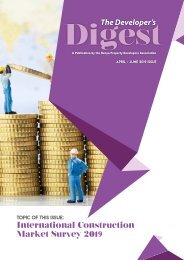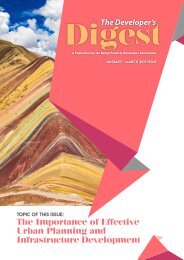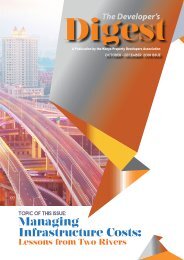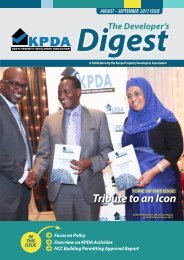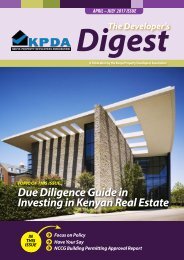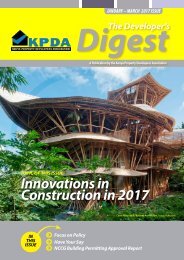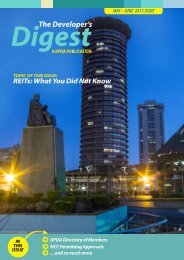The Developer's Digest, July to August 2015 Issue
Create successful ePaper yourself
Turn your PDF publications into a flip-book with our unique Google optimized e-Paper software.
FOCUS ON POLICY<br />
FOCUS ON POLICY<br />
REGISTRATION OF PROPERTY IN KENYA<br />
Findings of the Study Review of<br />
Registration of Property (Land) in Kenya<br />
A study conducted by the Kenya Institute<br />
for Public Policy Research and Analysis<br />
(KIPPRA)<br />
BACKGROUND<br />
Clearly defined property rights are the<br />
corners<strong>to</strong>ne of the property market<br />
and thus economic development. Such<br />
clarity facilitates efficiency by promoting<br />
voluntary exchange of property <strong>to</strong><br />
the highest bidder. However, clarity<br />
of property rights without protection<br />
through an efficient registration process<br />
is not a sufficient condition <strong>to</strong> guarantee<br />
market efficiency.<br />
Over the years, Kenya’s rankings in the<br />
World Bank’s Doing Business annual<br />
report have declined from position 71 in<br />
2006 <strong>to</strong> 131 in 2014 and further declined<br />
<strong>to</strong> 136 in <strong>2015</strong>. As a critical fac<strong>to</strong>r of<br />
production, land has a major role in an<br />
economy. <strong>The</strong> process of registering<br />
land forms part of the key indica<strong>to</strong>rs<br />
reviewed annually by the World Bank<br />
Doing Business rankings.<br />
This indica<strong>to</strong>r embodies the procedural<br />
process that an inves<strong>to</strong>r must follow<br />
while purchasing and selling property.<br />
In view of this, the Kenya Institute for<br />
Public Policy Research and Analysis<br />
(KIPPRA) conducted a study in April/May<br />
<strong>2015</strong> <strong>to</strong> review the process of registering<br />
property (land) with regards <strong>to</strong> time,<br />
costs, and associated procedures and<br />
challenges in selected counties in Kenya.<br />
Although the government has<br />
introduced land reforms, including<br />
policy and regula<strong>to</strong>ry changes, <strong>to</strong><br />
enhance efficiency in land transactions,<br />
the process of registratering land<br />
does not seem <strong>to</strong> have improved,<br />
warranting the need for review from a<br />
policy perspective. On 16th June <strong>2015</strong>,<br />
preliminary findings on “Registration<br />
of Property in Kenya” were presented<br />
during a policy dialogue at the Panafric<br />
Hotel.<br />
Participants during the dialogue included<br />
lawyers, architects, property developers,<br />
representatives from the National and<br />
County Government including Ministry<br />
of Land, Housing & Urban Development<br />
and Nairobi City County; other<br />
government agencies including <strong>The</strong><br />
Board of Registration of Architects and<br />
Quality Surveyors of Kenya (BORAQS)<br />
and National Housing Corporation<br />
(NHC); the civil society including Land<br />
Development and Governance Institute<br />
and Kenya Land Alliance and private<br />
sec<strong>to</strong>r representatives and professional<br />
organizations including Kenya Private<br />
Sec<strong>to</strong>r Alliance (KEPSA), Kenya Property<br />
Developers Association (KPDA),<br />
Architectural Association of Kenya (AAK),<br />
Institute of Surveyors of Kenya, Kenya<br />
Bankers Association (KBA) and Kenya<br />
Association of Manufactures (KAM).<br />
During the policy dialogue, Prof.<br />
Joseph Kieyah of KIPPRA presented the<br />
regula<strong>to</strong>ry land reforms in Kenya, linking<br />
them <strong>to</strong> the study’s findings.<strong>The</strong> study<br />
revealed a multiplicity of procedures and<br />
agencies associated with registration of<br />
property and the lack of clarity of roles of<br />
Ministry of Lands and the National Land<br />
Commission.<br />
Furthermore, the study affirmed that the<br />
procedure associated with registration<br />
of property remains largely unchanged<br />
despite the recent regula<strong>to</strong>ry reforms<br />
and in some instances introduced<br />
more registration delays and increased<br />
bureaucracy.<br />
<strong>The</strong> key policy issues identified during<br />
the policy dialogue included: <strong>The</strong><br />
importance of establishing appropriate<br />
land rights on all forms of land<br />
(especially community land); the need <strong>to</strong><br />
establish an effective dispute resolution<br />
mechanism; the need for clarity of<br />
roles of key players; the importance of<br />
a clean efficient and effective digitised<br />
land registries with clean titles; the<br />
importance of rationalizing functions <strong>to</strong><br />
ensure efficiency and the importance of<br />
a appropriate regula<strong>to</strong>ry framework.<br />
_ Prof. Joseph Kieyah and Anne Gi<strong>to</strong>nga<br />
INTRODUCTION<br />
One of the fac<strong>to</strong>rs that influence an<br />
inves<strong>to</strong>r’s investment choice is access <strong>to</strong><br />
land. <strong>The</strong> categories of land include:<br />
- Private<br />
- Public<br />
- Community land<br />
JUSTIFICATION OF THE LAND<br />
Given the importance of land and<br />
persistent land challenges, Kenya has<br />
carried out a number of reforms in the<br />
recent years. Kenya has however been<br />
performing poorly Doing Business<br />
rankings over the years, and is ranking<br />
at 136 out of the 189 economies in the<br />
<strong>2015</strong> report.<br />
Procedures of registering property have<br />
for instance remained constant over<br />
the last nine <strong>to</strong> ten years. <strong>The</strong> duration<br />
has also remained unchanged. This<br />
study will therefore review the process<br />
of registering property in Kenya with<br />
the aim of identifying opportunities for<br />
improvement<br />
WORLD BANK INDICATOR:<br />
Registration of Property<br />
Reviews procedures, time and costs<br />
associated with transferring property;<br />
- It follows the procedures followed by<br />
an inves<strong>to</strong>r purchasing property and<br />
subsequently transferring the property.<br />
Review is based on a number of<br />
assumptions key amongst them are:<br />
• <strong>The</strong> property is 100% domestically<br />
& privately owned.<br />
• <strong>The</strong> property has no mortgage<br />
and is free of titles disputes.<br />
• Land has a building and is located<br />
in a peri-urban commercial zone.<br />
<strong>The</strong> key challenge of these assumptions<br />
are:<br />
• <strong>The</strong>y serve a certain clientele;<br />
• Ignore a larger population which<br />
deals with property registration on<br />
a daily basis;<br />
• May fail <strong>to</strong> hold in certain<br />
economies.<br />
METHODOLOGY<br />
LEGAL FRAMEWORK<br />
1. <strong>The</strong> Constitution of Kenya (2010)<br />
• Compulsory Acquisition doctrine<br />
• Regula<strong>to</strong>ry<br />
• Interface between categories<br />
2. Establishes the principles of land<br />
policy<br />
3. Statu<strong>to</strong>ry Framework:<br />
- Registration;<br />
• Land Registration Act<br />
• Survey Act<br />
- Substantive <strong>Issue</strong>s:<br />
• Land Act<br />
• National Land Commission Act<br />
• Urban Areas and Cities Act<br />
POLICY REVIEW: LAND<br />
REFORMS FRAMEWORK<br />
<strong>The</strong> reforms were aimed at enhancing<br />
efficiency in land administration and<br />
management. Howeverm they are<br />
outdated and complex land laws<br />
addressed through simplification and<br />
the enactment of the Land Acts of 2012.<br />
Land administration has changed<br />
with the establishment of the National<br />
Land Commission and the County<br />
Land Management Boards. <strong>The</strong>re is a<br />
grave need <strong>to</strong> establish of land titling<br />
centre <strong>to</strong> facilitate the processing and<br />
digitization of land titled.<br />
NEED FOR FURTHER<br />
REFORMS<br />
Key informants expressed the need for<br />
further reforms on;<br />
• Enhancing efficiency in the<br />
conveyance process <strong>to</strong> reduce the<br />
duration.<br />
• Establishing a moni<strong>to</strong>ring and<br />
evaluation mechanism for land<br />
registration.<br />
• Enhancing human and capacity<br />
resources <strong>to</strong> implement reforms<br />
which may require capacity<br />
building.<br />
• Cleaning up for the registry <strong>to</strong><br />
address incidences of multiple<br />
land allocation and/or duplication<br />
of titles.<br />
• Clarity on the application of the 99<br />
leasehold periods; the transfer of<br />
existing titles under TLA and GLA<br />
and other transition aspects (given<br />
the systems used in the different<br />
registries are very different).<br />
REGISTRATION OF LAND:<br />
THE PROCURE<br />
1. Registration legal framework<br />
• Registration of Documents<br />
• Title Registration<br />
(Sanctity of title doctrine)<br />
2. Private Land in Kenya consists of land<br />
held by a person under freehold tenure<br />
and leasehold tenure.<br />
3. Title land can be acquired through<br />
allocation, land adjudication, compulsory<br />
acquisition, prescription, settlement<br />
programs, transmissions, transfers and<br />
long term leases exceeding twenty one<br />
years created out of private land.<br />
Kenya Property Developers Association... Development brings Development!<br />
Kenya Property Developers Association... Development brings Development!<br />
3<br />
4


